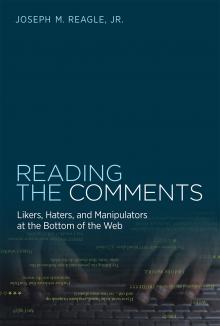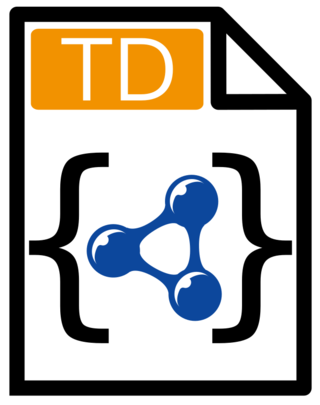
MeatballWiki is a wiki dedicated to online communities, network culture, and hypermedia. Containing a record of experience on running wikis, it is intended for "discussion about wiki philosophy, wiki culture, instructions and observations."

The World Wide Web Consortium (W3C) is the main international standards organization for the World Wide Web. Founded in 1994 and led by Tim Berners-Lee, the consortium is made up of member organizations that maintain full-time staff working together in the development of standards for the World Wide Web. As of 5 March 2023, W3C had 462 members. W3C also engages in education and outreach, develops software and serves as an open forum for discussion about the Web.
The Resource Description Framework (RDF) is a World Wide Web Consortium (W3C) standard originally designed as a data model for metadata. It has come to be used as a general method for description and exchange of graph data. RDF provides a variety of syntax notations and data serialization formats, with Turtle currently being the most widely used notation.

Benjamin Mako Hill is a free software activist, hacker, author, and professor. He is a contributor and free software developer as part of the Debian and Ubuntu projects as well as the co-author of three technical manuals on the subject, Debian GNU/Linux 3.1 Bible, The Official Ubuntu Server Book, and The Official Ubuntu Book.

HTML5 is a markup language used for structuring and presenting hypertext documents on the World Wide Web. It was the fifth and final major HTML version that is now a retired World Wide Web Consortium (W3C) recommendation. The current specification is known as the HTML Living Standard. It is maintained by the Web Hypertext Application Technology Working Group (WHATWG), a consortium of the major browser vendors.
"Ignore all rules" (IAR) is a policy used on Wikipedia, an online encyclopedia. The English Wikipedia policy reads: "If a rule prevents you from improving or maintaining Wikipedia, ignore it." [emphasis in original]. The rule was proposed by Wikipedia co-founder Larry Sanger to encourage editors to add information without focusing excessively on formatting, though Sanger later criticized the rule's effects on the community.
Web of Things (WoT) describes a set of standards by the World Wide Web Consortium (W3C) for the interoperability of different Internet of things (IoT) platforms and application domains.

Good Faith Collaboration: The Culture of Wikipedia is a 2010 book by Joseph M. Reagle Jr. that deals with the topic of Wikipedia and the Wikipedia community. The book was first published on August 27, 2010, through the MIT Press and has a foreword by Lawrence Lessig. The book is an ethnographic study of the history of Wikipedia, its real life and theoretical precursors, and its culture including its consensus and collaborative practices.
WebRTC is a free and open-source project providing web browsers and mobile applications with real-time communication (RTC) via application programming interfaces (APIs). It allows audio and video communication to work inside web pages by allowing direct peer-to-peer communication, eliminating the need to install plugins or download native apps.
This is a list of books about Wikipedia or for which Wikipedia is a major subject.
Ghacks Technology News is a technology blog created by Martin Brinkmann in October 2005. Its primary focus is on web browser and Windows tips, software, guides and reviews.

Gender bias on Wikipedia is a term used to describe various gender-related disparities on Wikipedia, particularly the overrepresentation of men among both volunteer contributors and article subjects, as well as lesser coverage of and topics primarily of interest to women.

The English Wikipedia has been criticized for having a systemic racial bias in its coverage. This bias partially stems from an under-representation of people of color within its volunteer editor base. In "Can History Be Open Source? Wikipedia and the Future of the Past," it is noted that article completeness and coverage is dependent on the interests of Wikipedians, not necessarily on the subject matter itself. The past president of Wikimedia D.C., James Hare, asserted that "a lot of [Black American history] is left out" of Wikipedia, due to articles predominately being written by white editors. Articles about African topics that do exist are, according to some, largely edited by editors from Europe and North America and thus, they only reflect their knowledge and their consumption of media, which "tend to perpetuate a negative image" of Africa. Maira Liriano of the Schomburg Center for Research in Black Culture has argued that the lack of information regarding Black history on Wikipedia "makes it seem like it's not important."

Reading the Comments: Likers, Haters, and Manipulators at the Bottom of the Web is a 2015 non-fiction book by Northeastern University professor Joseph M. Reagle Jr. The book was first published on April 24, 2015 through MIT Press and deals with the subject of Internet comments in locations like YouTube, Amazon, and forums.

Various publications and commentators have predicted the end of Wikipedia since it rose to prominence. Multiple potential dangers have been proposed, such as poor quality control and inconsistent editors/administrators.
Stalkerware is monitoring software or spyware that is used for cyberstalking. The term was coined when people started to widely use commercial spyware to spy on their spouses or intimate partners. Stalkerware has been criticized because of its use by abusers, stalkers, and employers.

María Sefidari Huici was the chair of the Wikimedia Foundation Board of Trustees from July 2018 until June 2021, having been re-elected to the position in August 2019. Sefidari was named a Techweek "Women's Leadership Fellow" in 2014. In 2018, an essay she wrote about the upcoming European copyright reform was widely covered, including by TechCrunch and Boing Boing.

The Thing Description (TD) (or W3C WoT Thing Description (TD)) is a royalty-free, open information model with a JSON based representation format for the Internet of Things (IoT). A TD provides a unified way to describe the capabilities of an IoT device or service with its offered data model and functions, protocol usage, and further metadata. Using Thing Descriptions help reduce the complexity of integrating IoT devices and their capabilities into IoT applications.
In Wikipedia and similar wikis, an edit count is a record of the number of edits performed by a certain editor, or by all editors on a particular page. An edit, in this context, is an individually recorded change to the content of a page. Within Wikimedia projects, a number of tools exist to determine and compare edit counts, resulting in their usage for various purposes, with both positive and negative effects.

Wikipedia @ 20 is a book of essays about Wikipedia published by the MIT Press in late 2020, marking 20 years since the creation of Wikipedia. It was edited by academic and author Joseph M. Reagle Jr. and social researcher Jackie Koerner. Contributions came from 34 other Wikipedians, Wikimedians, academics, researchers, journalists, librarians, artists and others, reflecting on particular histories and future themes in Wikipedia discussions.












